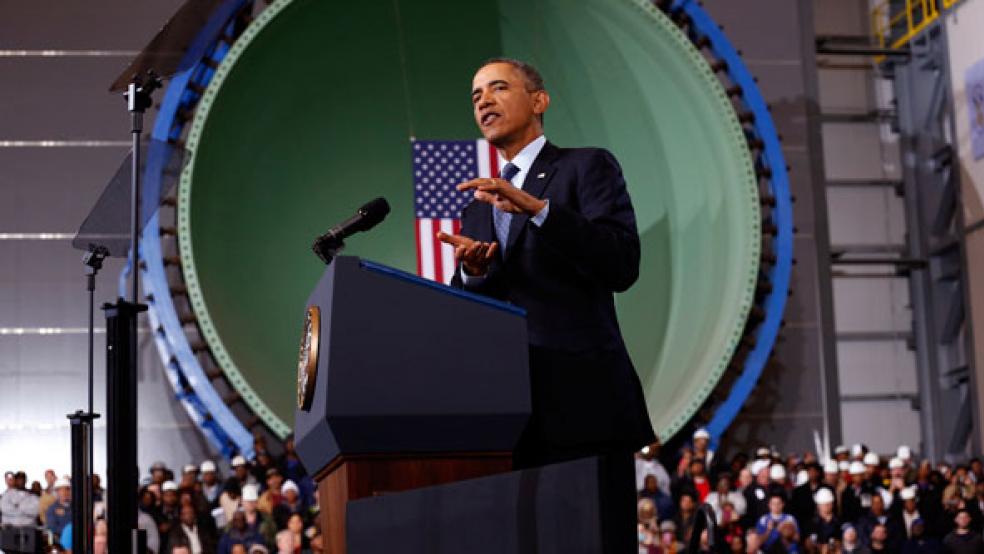President Obama has labored over the past few days to make the looming $85 billion of across the board cuts tangible for the public. He has surrounded himself with first-responders and filled the front pages of local newspapers with estimates of jobs at risk in their communities. This afternoon, Obama upped his stagecraft by speaking from a southeastern Virginia shipyard – an area where any reductions would be seen on a human level.

Virginia may be for lovers, but the commonwealth is also a magnet for national security dollars.
By speaking to hundreds of shipyard workers in Newport News, the assumption was that Obama has targeted the home state of House Majority Leader Eric Cantor to pressure the Republican leadership to accept additional tax increases to prevent the sequester from taking effect on Friday. The sequester threatens the layoffs and furloughs of hundreds of thousands of government and defense industry workers in Virginia and the rest of the country.
BLAMING THE GOP
But even in geography, the speech was not an olive branch to Republicans. Obama was shoring up his base where it was strongest. He won more than 64 percent of the vote in Newport News last year, and more than 72 percent in nearby Norfolk, according to the Virginia Board of Elections.
“Sequester will weaken America’s economic recovery, it will weaken our military readiness and it will weaken the basic services the American people depend on every single day,” Obama said. The president delivered his dire warning of economic woes to come in a state that ironically has escaped the worst of the recession, thanks to government spending fueled by deficits.
Hundreds of billions set aside for defense, homeland security and an armada of private contractors transformed Virginia and other Washington-area regions into the country’s largest cluster of wealth. Virginia’s unemployment rate peaked at 7.2 percent during the worst of the recession, almost three percentage points below the national average.
But the boom times are beginning to fade just as the wars in Afghanistan and Iraq are winding down. As Congress and the White House grapple over how to reduce the long-term deficit, the 2011 Budget Control Act could send the commonwealth’s once super-charged economy into the tank. $917 billion in cuts over the next decade, split equally between defense and domestic spending, will take a huge toll on Virginia’s economy.
Nowhere are Virginians likely to feel the pain more intensely than in Newport News, a nexus of aircraft carrier and submarine manufacturers and naval and military facilities. The president sounded specific warnings, claiming 18,000 fewer Virginians will get the skills and training they need to find jobs; 2,000 Virginia college students will lose financial aid; and early education programs will be eliminated for 1,000 children.
"These cuts are wrong,” Obama told the crowd as he mocked the Republicans. “They’re not smart. They’re not fair. They’re a self-inflicted wound that doesn’t have to happen."
Obama has insisted that any substitute for the sequester balance spending cuts with new revenue by eliminating tax loopholes for corporations and tax deductions wealthy Americans. House Speaker John Boehner, R-Ohio, and other GOP leaders have ruled out more tax cuts and are proposing an alternate set of spending cuts that protect defense from most of the reductions.
CUTS TO GUNS AND BUTTER
Newport News is nestled in the heart of Hampton Roads, a southeastern Virginia region whose economy and culture are largely defined by the tens of thousands of military contractors, personnel and veterans.
“The worm has turned here in Hampton Roads,” James V. Koch, an economics professor at Old Dominion University in Norfolk, told The Fiscal Times on Tuesday. “Military spending was a really positive engine of growth for the region over the last year, but now military has decelerated and may even decline. So quite the opposite will occur and we will see the economy contract here.”
The huge defense and government footprint in Virginia was once hailed as the salvation of the state’s economy, but now it may become an albatross around its neck as federal government spending begins to decline.
Slightly more than 46 percent of the region’s economy now depends on defense spending, which “makes Hampton Roads one of the most vulnerable regions in the United States to sequestration, because half of the sequestration is going to come from defense spending,” Koch said.
Unless Obama and congressional leaders find a way to cancel or blunt the $42.7 billion of looming defense cuts this year under sequestration, the Hampton Roads economy stands to lose an estimated $2.5 billion in spending this year – and some of that loss is already being felt. The Navy decided to postpone a multi-billion-dollar overhaul of the carrier USS Abraham Lincoln in Newport News pending resolution of the budget crisis.
Last year, $22 billion was spent on defense in the region – which amounted to 47 percent of the region’s overall economy. Factor in how that money trickles through the community and nearly two thirds of the region’s economy is dependent on defense and other types of federal spending, according to Koch. If sequestration is fully implemented this year, it could cost the region as many as 42,000 jobs – or 4.2 percent of its job base.
In other words, the stunning growth of the past several years has stalled and that has real economic consequences for landlords, coffee shops, and even the Virginia Commonwealth budget. “This state is tied at the hip, the rib and a few other joints with federal spending,” said Stephen Fuller, director of George Mason University’s Center for Regional Analysis.
Many fear that those golden days are behind them and that their community will fall victim to petty political bickering and gamesmanship in Washington. “We’re paying [national leaders] a whole lot of money . . . but they’re not doing a damn thing,” Kenny Marr, a welding foreman in the shipyard, told The Washington Post. “If they cut here, then all the good they say they’re doing about jobs is going to disappear.”
The Fiscal Times’ Josh Boak contributed to this report.



